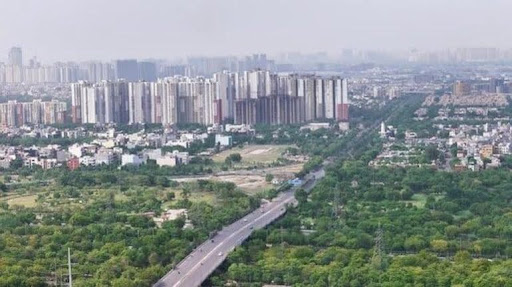In one of its boldest decisions in recent years, the Noida Authority has moved to cancel the allotment of residential plots that have remained vacant for more than 12 years. This strict action targets non-compliant allottees who have failed to construct houses on their plots despite repeated notices.
The decision came during the 219th board meeting, chaired by Uttar Pradesh Infrastructure and Industrial Development Commissioner Deepak Kumar. The authority clarified that vacant plots not only spoil the city’s urban fabric but also violate the purpose of allotment.
Also Read: How To Check RERA Registered Projects in Noida: A Complete Guide
What Happens to Owners Who Haven’t Built Homes?
Under the new rule, if an allottee fails to construct a home within 12 years, the plot will be forfeited. For those already under construction, a six-month grace period has been granted to complete work and secure a completion certificate.
Currently, 17 plots have crossed the 12-year limit without completion. Of these, nine have seen no construction at all and are likely to face immediate cancellation. Officials also revealed that nearly 1,500 of the 30,000 allotted plots show only token construction—minimal structures built just to obtain a completion certificate. These are later resold at premium rates, turning housing plots into speculative assets rather than functional homes.
Noida’s Crackdown on Defaulting Developers
The board also took stock of stalled housing projects under the ‘legacy housing projects’ policy. Despite receiving concessions in 2023—where developers were allowed to pay 25% upfront and the balance over three years with interest waivers—many builders defaulted.
- 10 developers have not paid any land cost at all.
- 25 developers made only partial payments.
- 35 developers stopped paying after the initial 25%.
This has left thousands of homebuyers stuck. While registries for 3,724 flats have been executed, 5,758 units remain on hold until dues are cleared. To address this, the authority has now decided to withdraw all interest concessions for defaulting developers, signaling a stricter recovery approach.
Also Read: How to Make a Rent Agreement in Delhi NCR for Students: A Complete Guide
Aligning Development Across NCR
Another key outcome of the board meeting was the adoption of the Unified Regulations-2025, ensuring consistent rules for allotments, payment schedules, and approvals across Noida, Greater Noida, and Yamuna Expressway regions. This harmonisation aims to simplify processes for both developers and homebuyers.
Push Towards Sustainability
The Noida Authority also approved multiple infrastructure and environmental initiatives, including:
- An integrated solid waste management plant at Mubarakpur, Sector 145, with a capacity to process 300 tonnes daily. The plant will generate electricity, produce fertilizer, and provide treated water.
- ₹86.67 crore sanctioned for retrofitting sewage treatment plants in Sectors 35, 54, 123, and 168. The upgraded STPs will recycle wastewater for parks and keep drains cleaner.
- Launch of a mobile app to track civic projects such as road construction, park upgrades, and drain repairs, bringing more transparency and accountability to governance.
Also Read: Delhi-Mumbai Industrial Corridor: Route Map | Status | Completion Date
What This Means for Residents and Buyers
The authority’s recent decisions reflect a paradigm shift in its approach: discouraging speculative land hoarding, holding developers accountable, and focusing on sustainable urban development. For homebuyers, these measures may unlock long-delayed projects and create a more transparent housing ecosystem in Noida.
In one of its boldest decisions in recent years, the Noida Authority has moved to cancel the allotment of residential plots that have remained vacant for more than 12 years. This strict action targets non-compliant allottees who have failed to construct houses on their plots despite repeated notices.
The decision came during the 219th board meeting, chaired by Uttar Pradesh Infrastructure and Industrial Development Commissioner Deepak Kumar. The authority clarified that vacant plots not only spoil the city’s urban fabric but also violate the purpose of allotment.
Also Read: How To Check RERA Registered Projects in Noida: A Complete Guide
What Happens to Owners Who Haven’t Built Homes?
Under the new rule, if an allottee fails to construct a home within 12 years, the plot will be forfeited. For those already under construction, a six-month grace period has been granted to complete work and secure a completion certificate.
Currently, 17 plots have crossed the 12-year limit without completion. Of these, nine have seen no construction at all and are likely to face immediate cancellation. Officials also revealed that nearly 1,500 of the 30,000 allotted plots show only token construction—minimal structures built just to obtain a completion certificate. These are later resold at premium rates, turning housing plots into speculative assets rather than functional homes.
Noida’s Crackdown on Defaulting Developers
The board also took stock of stalled housing projects under the ‘legacy housing projects’ policy. Despite receiving concessions in 2023—where developers were allowed to pay 25% upfront and the balance over three years with interest waivers—many builders defaulted.
- 10 developers have not paid any land cost at all.
- 25 developers made only partial payments.
- 35 developers stopped paying after the initial 25%.
This has left thousands of homebuyers stuck. While registries for 3,724 flats have been executed, 5,758 units remain on hold until dues are cleared. To address this, the authority has now decided to withdraw all interest concessions for defaulting developers, signaling a stricter recovery approach.
Also Read: How to Make a Rent Agreement in Delhi NCR for Students: A Complete Guide
Aligning Development Across NCR
Another key outcome of the board meeting was the adoption of the Unified Regulations-2025, ensuring consistent rules for allotments, payment schedules, and approvals across Noida, Greater Noida, and Yamuna Expressway regions. This harmonisation aims to simplify processes for both developers and homebuyers.
Push Towards Sustainability
The Noida Authority also approved multiple infrastructure and environmental initiatives, including:
- An integrated solid waste management plant at Mubarakpur, Sector 145, with a capacity to process 300 tonnes daily. The plant will generate electricity, produce fertilizer, and provide treated water.
- ₹86.67 crore sanctioned for retrofitting sewage treatment plants in Sectors 35, 54, 123, and 168. The upgraded STPs will recycle wastewater for parks and keep drains cleaner.
- Launch of a mobile app to track civic projects such as road construction, park upgrades, and drain repairs, bringing more transparency and accountability to governance.
Also Read: Delhi-Mumbai Industrial Corridor: Route Map | Status | Completion Date
What This Means for Residents and Buyers
The authority’s recent decisions reflect a paradigm shift in its approach: discouraging speculative land hoarding, holding developers accountable, and focusing on sustainable urban development. For homebuyers, these measures may unlock long-delayed projects and create a more transparent housing ecosystem in Noida.







